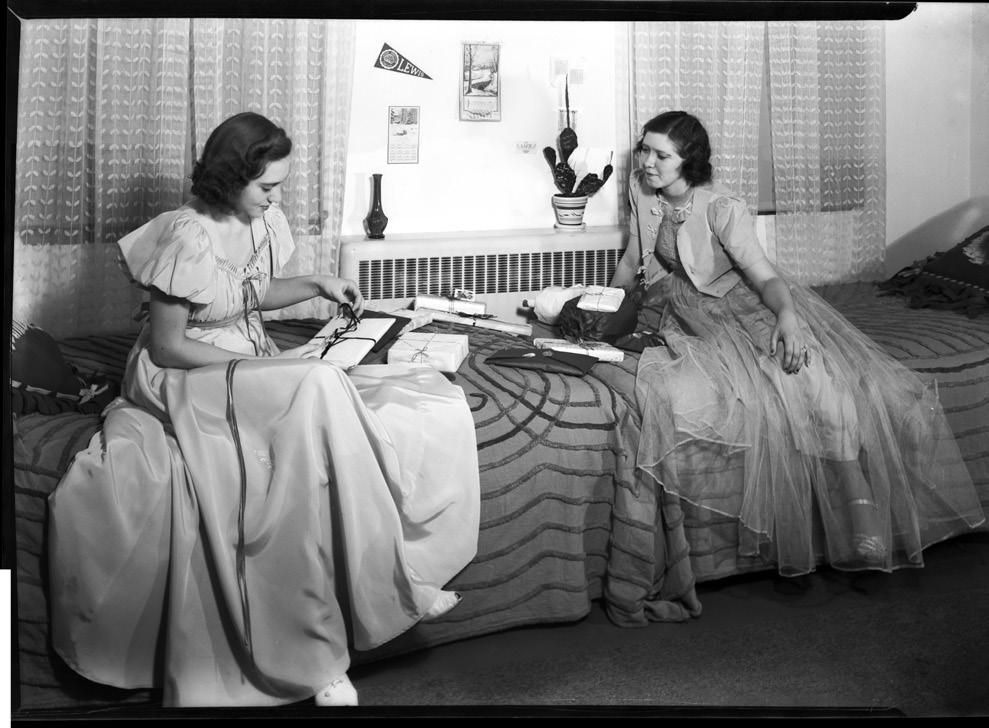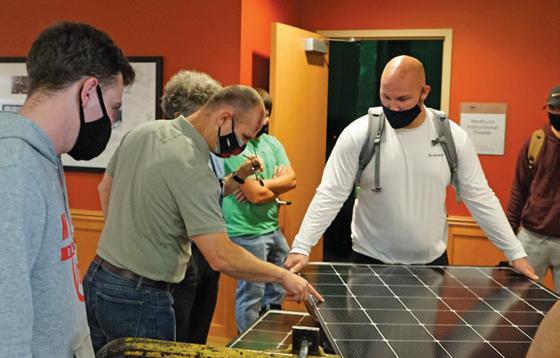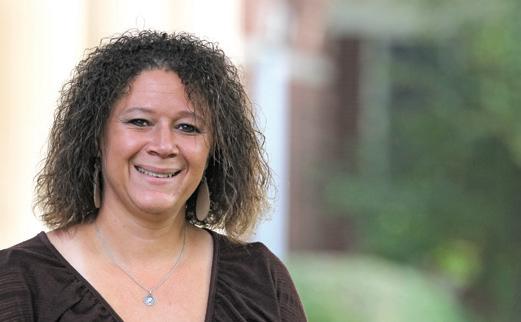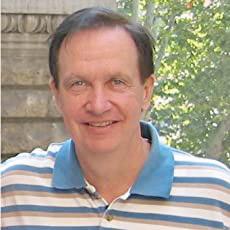
6 minute read
around campus
AROUND CAMPUS
Educational Farm gets another boost from Compeer Financial
Advertisement
Compeer Financial’s Fund for Rural America has awarded a $25,000 grant to the Monmouth College Educational Studies PLACE Site. An acronym for Partnerships Linking Agriculture, Community and Education, the PLACE Site program seeks to be a catalyst for agriculture-based educational partnerships and curriculum. It scales up work that began at the College’s Educational Farm and Garden in 2019 with another grant. “We received a $10,000 grant from Compeer last year, so this grant shows their confidence and trust in what we’re trying to achieve,” said Monmouth It will be a nice, full educational studies professor Craig Vivian. “With this grant, we want curriculum that is housed to build up the infrastructure at our out at the farm, with farm and garden for education and features: an agricultural curriculum for the community and curriculum. One way we plan to do students from kindergarten through high school; spaces for the …microscopes and tools that is to furnish the new geodesic public to interact with agriculture; an interdisciplinary network to observe, measure and dome (see page 10) with some different tools and technologies.” of experts; and a platform to highlight the community’s agricultural experiences. analyze the natural world Doing so would take the farm, which is located a half-mile east of Vivian’s hope is that the program will serve as a model of agricultural education and engagement for other rural we find at the farm.” campus, from a field trip destination to a site where all-day learning could communities in the region. —Professor Craig ViVian take place. “I’m really big on agrarian philosophy, and this type of “The idea is that students can learning, specifically, helps students think about the world spend the majority of their school day out there,” said Vivian. and their place in it through the culture of agriculture,” said “It won’t just be a 30-minute field trip and then head back to Vivian. “It also provides a way to connect public schooling to school. We’ll be able to cover a lot of areas with them, such as Monmouth College and to connect the city and College.” biology, math and literature. The math could come from things Vivian’s department colleague Jenni Dickens agreed with like measurements and statistics and tracking things like rate Vivian about the importance of connections. of growth. The literature could be reading about agricultural “This grant will give our community’s students an issues that we’re facing locally. It will be a nice, full curriculum unprecedented opportunity to learn how agriculture connects that is housed out at the farm, with plenty of tools they can use, us all,” said Dickens, who serves as the educational studies such as microscopes and tools to observe, measure and analyze department’s director of partnerships and initiatives. “Even the natural world we find at the farm.” better, it will give them the space and resources to change Through presentations, digital and on-site workshops, and their community for the better, starting now, through the vital, social media outreach, the PLACE Site aims to develop four common thread of agriculture.”
Located within easy walking distance of campus, Monmouth's Educational Farm continues to develop, expanding both its agricultural production and its educational offerings.
A gift of contemplation
A gift to Monmouth College will help members of the College community unplug, unwind and enjoy a contemplative experience.
Jon Dahl ’75 and his wife, Barbara, of Indianapolis have made a gift to enable Monmouth to build a labyrinth on campus. Expected to be completed in 2021, the labyrinth’s location is yet to be determined. Jon ’75 and Barbara Dahl hope their gift of a labyrinth on campus will help
“We have enjoyed the labyrinth ex- students reflect and relax. perience, and we want to share it with the Monmouth community, as a spiritual and meditative outlet,” said Jon.
A labyrinth is a meandering, often unicursal, path that has a single way that leads to a center.
Experiencing a labyrinth can help Monmouth students bring issues into a spiritual context, Jon explained, adding: “When I think about a labyrinth on Monmouth’s campus, I think about decisions a student might need to really reflect on, such as, ‘Should I pursue an MBA after I graduate?’ or ‘What are my plans after Monmouth?’ It could also be for fun. My first time in a labyrinth was on New Year’s Eve in 1998 at a monastery. I thought it would be a fun and different way to ring in the new year. And my first experience was giddy. I wanted to laugh out loud, but I didn’t. The director told me I should’ve—that it’s part of the unique labyrinth experience that every individual has.”
Monmouth Dean of the Chapel the Rev. \Teri Ott said a labyrinth will become a great campus resource.
“(Associate Chaplain the Rev. Jessica Hawkinson) and I look forward to facilitating individuals, student organizations, classes or visiting church groups in its use,” she said. “We live in such a noisy, distracting, digital age. This labyrinth will offer a meditative, centering practice to our campus community and will be an invaluable spiritual resource.”
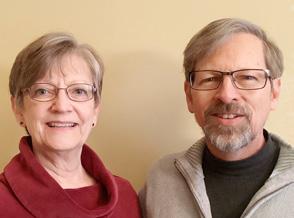
Echols named trustee
Dr. Harvey Echols ’81 of Plano, Texas, has been named to the Monmouth College Board of Trustees.
Echols, who most recently served as a member of the College’s Alumni Association Board, said he is “deeply honored and humbled” to be named a Monmouth trustee.
“In one sense, I don’t feel like I’m old enough to be a trustee because I still remember seeing the trustees on campus when I was a Monmouth student and thinking, ‘These are people who are the pillars of their community and have served long, distinguished careers,’” said Echols, who is pharmacy medical director for Oscar Health, a New York-based health insurance company. “That’s why I am deeply honored and humbled to be invited to serve on the Board, because of the caliber of individuals who serve on it and work to ensure that Monmouth remains a strong college for generations of students to come.”
After graduating from Monmouth with a biology degree, Echols spent a year working in the College’s Office of Admission before heading to medical school at Southern Illinois University School of Medicine. He completed his residency at Cook County Hospital in Chicago and a sports medicine fellowship at Midwestern (Ill.) University.
Monmouth College has been named to Phi Theta Kappa’s 2021 Transfer Honor Roll, recognition that it is one of the nation’s most transfer-friendly schools for community college students.
Phi Theta Kappa is the leading academic honorary society for students at two-year institutions.
Monmouth is one of 150 colleges and universities named to the honor roll for “excellence in the development and support of dynamic and innovative transfer pathways for community college transfer students,” according to Monmouth Associate Director of Admission Wendy Downing.
President Clarence R. Wyatt said the national honor is the result of a campus-wide effort to work with students who want to transfer from a community college.
“As has long been true, Monmouth puts the student at the center of all that we do,” said Wyatt. “In recent years, that has included being a place that is more attractive and accessible to students who begin their college careers at two-year institutions.” Business administration, education, exercise science and psychology are among the more popular majors with community college students who transfer to Monmouth. “In many cases, students can earn a bachelor’s degree in two years from Monmouth after studying for two years at a community college,” Downing said.
Monmouth offers a special scholarship for community college students who are a member of Phi Theta Kappa. The College also annually awards a full-tuition scholarship, the Wallace Founders Scholarship, to one transfer student.


